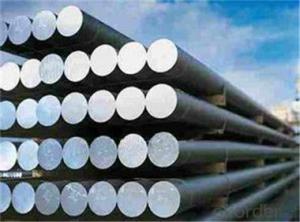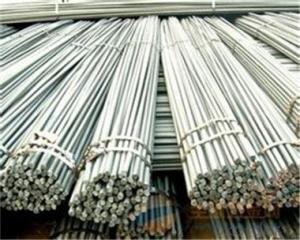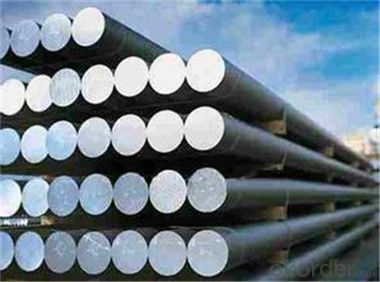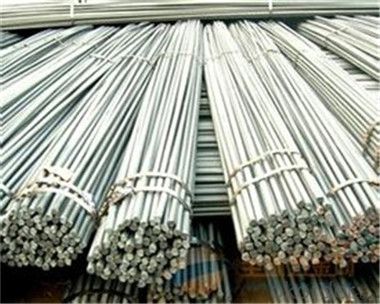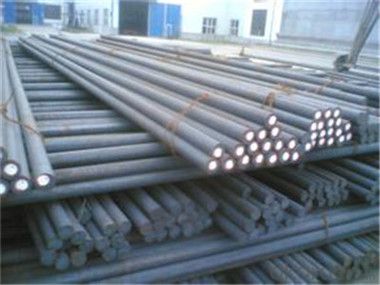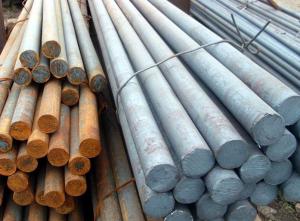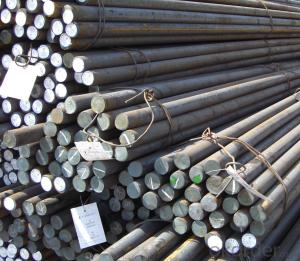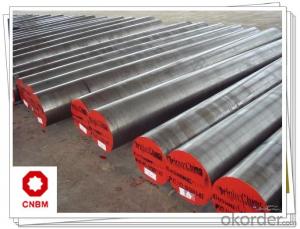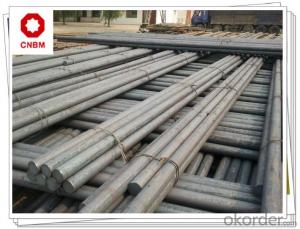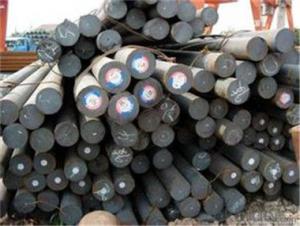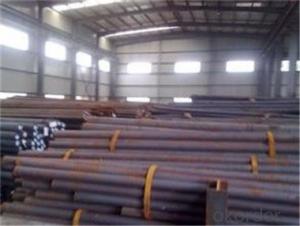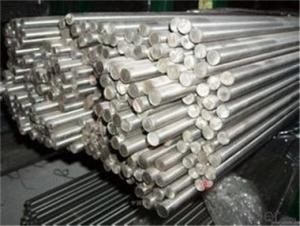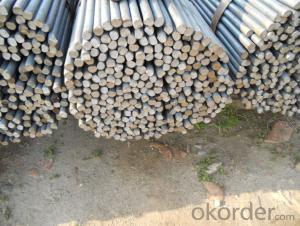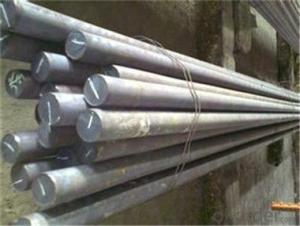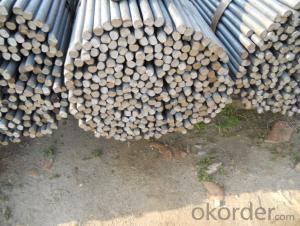Steel Round Bar in China with High Quality Cheaper SAE1018
- Loading Port:
- Tianjin
- Payment Terms:
- TT OR LC
- Min Order Qty:
- 200 m.t.
- Supply Capability:
- 20000333 m.t./month
OKorder Service Pledge
OKorder Financial Service
You Might Also Like
Description of steel round bar:
Mild steel is sometimes referred to as carbon steel or plain steel. Typically, it is stiff and strong. Carbon steelsdo rust easily, but they can be easily painted or primed. They are cheap so they are the normal choice for most fabrications. Mild Steel can be easily cut or drilled to meet your requests.
Mild Steel Round Bar is used for making security grills, screens, Construction and Machine Manufacture.
Festures of steel round bar:
Forged + Annealed + Machining (Peeled/Turned)
Rockwell Hardness: 64-66
Quenching Temperature: 1190-1230
Specifications of steel round bar:
Grade | Chemical Contents % | ||||
C | Si | Mn | P | S | |
45 | 0.42~0.50 | 0.17~0.37 | 0.50~0.80 | ≤0.035 | ≤0.035 |
50 | 0.47~0.55 | 0.17~0.37 | 0.50~0.80 | ≤0.035 | ≤0.035 |
55 | 0.52~0.60 | 0.17~0.37 | 0.50~0.80 | ≤0.035 | |
Images of steel round bar:
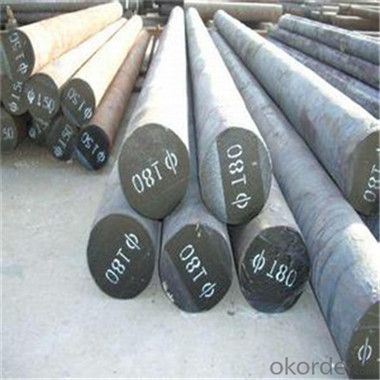
FAQ:
1. What is your package?
Packing situation: standard seaworthy packing or as customer required.
2. How long is the lead time?
Delivery time: 45 days after order confirmed.
3. What payment term do you accept?
Payment: T/T or L/C at sight.
- Q: What is the difference between a solid steel round bar and a hollow steel round bar?
- A solid steel round bar is a cylindrical metal rod that has a uniform diameter throughout its entire length. It is made of solid steel, meaning it does not have any hollow or empty space inside. On the other hand, a hollow steel round bar also has a cylindrical shape but contains a hollow or empty space within its center. This hollow space can vary in size, depending on the specific design and purpose of the hollow round bar. The main difference between the two lies in their structural integrity and weight-bearing capacity. A solid steel round bar offers greater strength and stability compared to a hollow steel round bar. This is because the solid bar is made of a continuous steel material, making it more resistant to bending, twisting, or deforming under pressure. It is commonly used in applications where high strength and durability are required, such as construction, engineering, and manufacturing industries. In contrast, a hollow steel round bar may have reduced strength and load-bearing capacity due to the presence of the hollow space within. However, the hollow design provides certain advantages in terms of weight, cost, and flexibility. The hollow space allows for a lighter overall weight of the bar, making it more suitable for applications where weight is a critical factor, such as aerospace or automotive industries. Additionally, the hollow space can be utilized for various purposes, such as passing through electrical wires or fluids, providing a channel for ventilation, or even reducing material costs by using less steel. Ultimately, the choice between a solid steel round bar and a hollow steel round bar depends on the specific requirements of the application. If strength and stability are paramount, a solid bar would be the preferred choice. Conversely, if weight reduction, cost-efficiency, or additional functionality is desired, a hollow bar may be more suitable.
- Q: What are the different types of steel round bar alloys for improved machinability and strength?
- Some of the different types of steel round bar alloys for improved machinability and strength include free-cutting steel, alloy steel, and tool steel. Free-cutting steel is specifically designed to be easily machinable, allowing for faster and more efficient machining processes. Alloy steel contains various additional elements such as chromium, nickel, or molybdenum, which enhance its strength and wear resistance. Tool steel is a high-performance alloy that is often used in the production of cutting tools and machinery components, offering exceptional hardness and durability.
- Q: How to determine the welding seam height of steel plate and steel bar?
- How to determine the welding seam height of steel plate and steel bar?:If the steel plate surface and steel end vertical welding, welding angle height depends on the diameter of the steel, general welding angle height is 0.7 times the diameter of reinforcement;
- Q: Are steel round bars suitable for the production of axles?
- Yes, steel round bars are suitable for the production of axles. Steel round bars are known for their high strength and durability, making them ideal for the heavy-duty requirements of axles. They can withstand the forces and stresses applied during operation, ensuring the axles can efficiently support and transmit the load. The round shape of the bars also allows for easy machining and forming into axles of various sizes and configurations.
- Q: What are the common sizes and dimensions of steel round bars?
- Common sizes and dimensions of steel round bars vary depending on the application and industry. However, some commonly available sizes range from 1/4 inch to 24 inches in diameter, with lengths typically ranging from 10 to 20 feet. Additionally, standard dimensions for steel round bars often follow ASTM (American Society for Testing and Materials) specifications.
- Q: Are steel round bars suitable for use in the construction of bridges?
- Indeed, steel round bars prove to be a suitable choice for the construction of bridges. Offering a multitude of advantages, they are an ideal option for such projects. To begin with, steel round bars exhibit remarkable tensile strength, enabling them to withstand substantial loads and forces without undergoing deformation or breakage. This attribute holds paramount importance for bridges, as they bear the weight of vehicles and pedestrians. By possessing high tensile strength, steel round bars ensure the structural integrity and safety of the bridge. Furthermore, steel round bars boast exceptional durability and resistance to corrosion. Considering the exposure of bridges to adverse environmental conditions like rain, snow, and saltwater, materials employed in their construction are susceptible to corrosion and deterioration. However, steel round bars are specifically designed to counteract these effects, guaranteeing the longevity and dependability of the bridge. Moreover, steel round bars are widely available in various sizes and lengths, catering to the versatility and adaptability required for different bridge designs and configurations. The uniform circular shape of these bars simplifies the construction process, enabling easy cutting, bending, and welding to meet the necessary specifications. In addition, steel round bars offer cost-effectiveness in bridge construction. Their favorable strength-to-weight ratio allows them to provide the required strength while minimizing the overall weight of the bridge. Consequently, this reduces the amount of material needed and lowers transportation costs during construction. In conclusion, steel round bars are highly suitable for bridge construction due to their high tensile strength, durability, corrosion resistance, versatility, and cost-effectiveness. They deliver the necessary strength and reliability to support heavy loads and withstand adverse environmental conditions, ensuring the safety and durability of the bridge.
- Q: How do you determine the strength of a steel round bar?
- The strength of a steel round bar can be determined through various methods, including physical testing and material specifications. One common method is to conduct a tensile test, which involves pulling the bar until it reaches its breaking point. This test helps determine the ultimate tensile strength (UTS) of the steel, which is the maximum stress it can withstand before fracturing. The UTS is typically measured in units of force per unit of cross-sectional area, such as pounds per square inch (psi) or megapascals (MPa). Another important strength property to consider is the yield strength. This is the stress level at which the steel starts to deform permanently, without any increase in load. The yield strength is crucial in determining the structural integrity of the bar, as it indicates the maximum load it can bear without undergoing plastic deformation. In addition to physical testing, the strength of a steel round bar can also be determined by its material specifications. Steel manufacturers provide information about the composition and mechanical properties of their products. This includes details about the steel grade, which indicates the alloying elements present in the steel and their concentrations. Different steel grades have varying strength properties, which can help determine the strength of the round bar. It is important to note that the strength of a steel round bar may also be influenced by other factors, such as heat treatment or surface conditions. Heat treatment processes like quenching and tempering can enhance the strength and hardness of the steel, while surface conditions like coatings or treatments can improve corrosion resistance. To accurately determine the strength of a steel round bar, it is recommended to consult the material specifications provided by the manufacturer and consider conducting physical tests, such as tensile testing, if necessary.
- Q: What is galvanized round bar?
- A cylindrical bar of iron or steel bar that crosses a layer of zinc on its surface.
- Q: What are the different types of steel round bar alloys for improved corrosion resistance?
- There are several types of steel round bar alloys that are known for their improved corrosion resistance. Some of the commonly used alloys include stainless steel, weathering steel, and duplex stainless steel. 1. Stainless Steel: This alloy contains a minimum of 10.5% chromium, which forms a thin, protective layer of chromium oxide on the surface of the steel. This layer acts as a barrier against corrosion, making stainless steel highly resistant to rust and other forms of corrosion. Different grades of stainless steel, such as 304 and 316, offer varying levels of corrosion resistance depending on the specific application. 2. Weathering Steel: Also known as Corten steel, weathering steel develops a protective rust-like appearance when exposed to the weather. This self-healing characteristic makes it resistant to atmospheric corrosion. The addition of copper, chromium, and nickel in weathering steel enhances its corrosion resistance and enables it to withstand harsh environmental conditions without the need for painting. 3. Duplex Stainless Steel: Duplex stainless steel is a combination of austenitic and ferritic stainless steels. This alloy offers excellent corrosion resistance due to its high chromium and molybdenum content. Duplex stainless steel is particularly resistant to localized corrosion, such as pitting and crevice corrosion, making it suitable for applications in aggressive environments like marine and chemical industries. It is important to note that the choice of steel round bar alloy for improved corrosion resistance depends on the specific application requirements and environmental conditions. Consulting with a materials engineer or corrosion specialist can help determine the most suitable alloy for a particular application.
- Q: Can steel round bars be anodized?
- Steel round bars cannot be anodized as anodizing is exclusively tailored for aluminum and its alloys. This process entails generating an oxide layer on the metal's surface, offering improved corrosion resistance and decorative possibilities. In contrast, steel lacks the ability to form a stable oxide layer like aluminum, thus precluding anodization. Nevertheless, alternative surface treatment alternatives, such as galvanizing or powder coating, can be employed for steel, yielding comparable advantages.
Send your message to us
Steel Round Bar in China with High Quality Cheaper SAE1018
- Loading Port:
- Tianjin
- Payment Terms:
- TT OR LC
- Min Order Qty:
- 200 m.t.
- Supply Capability:
- 20000333 m.t./month
OKorder Service Pledge
OKorder Financial Service
Similar products
Hot products
Hot Searches
Related keywords
